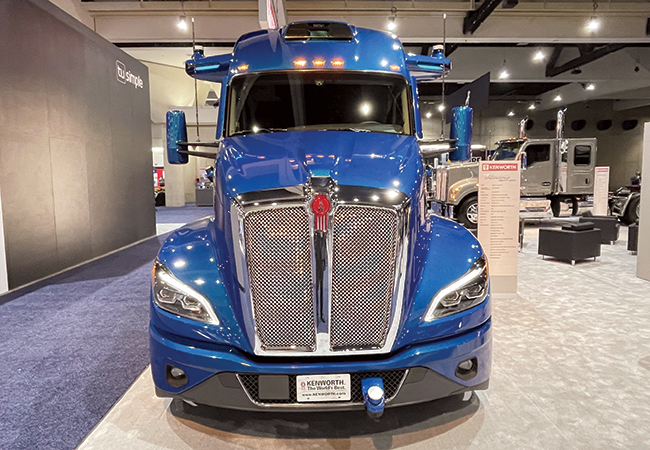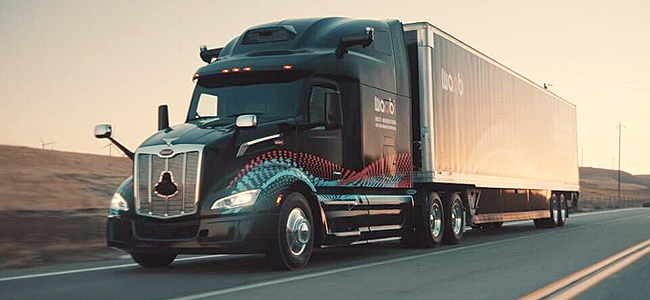Managing Editor, Features
Who’s Who in Self-Driving Truck Development

[Attend our upcoming virtual event with sessions dedicated to issues in technology, innovation and operations: Register for Automate!]
The process of developing, validating and ultimately commercializing fully autonomous trucks has proven to be a long and arduous journey, but there is no shortage of software developers and technologists dedicated to accomplishing that mission.
More than a dozen technology companies and startups are actively working to solve the myriad technical and business challenges associated with bringing self-driving trucks to market and widely deploying them in the trucking industry.
While a few of these companies, such as Waymo and Torc Robotics, have been working on autonomous vehicle technology for well over a decade, the majority are startup firms founded 4-7 years ago. Newcomers such as Waabi continue to enter the space as well.
Company Sketches
Click the links to jump to profiles of autonomous companies below.
Aurora | Waymo | TuSimple | Gatik | Locomation | Torc Robotics | Waabi | Einride | Plus | Embark | Kodiak Robotics | Robotic Research | Outrider | Pronto
Automated vehicle consultant Richard Bishop said autonomous truck development has advanced significantly since it first became a prominent topic among industry leaders in the middle of the past decade.
“It was this wild and crazy new idea back in 2015,” said Bishop, principal at Bishop Consulting. “Looking over these last seven years, the [autonomous] truck industry has matured a lot.”
Development work has extended well beyond the initial trials focused on proving the feasibility of the technology, he said. In recent years, technology developers and their motor carrier and shipper partners have moved on to the details of how autonomous trucks could fit into their real-world operations, including vehicle maintenance and interactions with law enforcement.
Along the way, some very large freight transportation companies have been gaining firsthand experience with the technology through pilot programs.
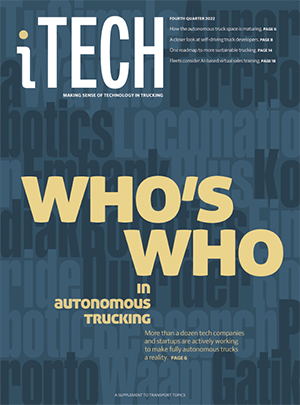
Q4 iTECH
►Who's Who in Self-Driving Truck Development
►Swarm Launches Satellite-Based Tracking Device
►Spireon Introduces Next-Gen Cargo Sensor
►Burrows: The Path Toward Sustainable Trucking
►Dysart: AI-Powered Sales Coaching
►Clevenger: Catching a Glimpse of Trucking’s Future
Explore the Issue!
Autonomous truck companies have been conducting on-road tests and pilots concentrated primarily in the Sun Belt, especially in Texas, Arizona and New Mexico. At this stage, these test vehicles operate with a safety driver behind the wheel and an operations specialist in the passenger seat.
“I think there are trucking companies that have done a sufficient amount of testing to where they’re ready when the tech is ready,” Bishop said.
Those eventual deployments will depend not only on the readiness of technology developers’ self-driving software, but also the availability of autonomous-ready tractors rolling out of truck makers’ factories in significant quantities.
Some autonomous vehicle developers have formed partnerships with truck manufacturers to integrate their self-driving technology with truck platforms equipped with redundant systems and components to support full autonomy.
For some business cases, the commercial launch of autonomous trucks has already begun.
In August 2021, autonomous trucking firm Gatik began fully driverless operations on a shorthaul delivery route for Walmart, moving freight on public roads in Bentonville, Ark., between a logistics site and a store location with its fleet of self-driving, medium-duty box trucks.
“Commercialization has already started with the Gatik-Walmart operation,” said Bishop, who is an adviser to Gatik and several other automated truck developers.
Over the years, the development of autonomous trucks has splintered into more narrowly defined and diverse use cases.
While the most common approach is automating hub-to-hub highway routes on major shipping lanes, some developers are focusing instead on automating shorthaul deliveries, deploying automated follower vehicles in truck convoys or enabling unmanned operations in logistics yards or industrial sites.
Initially, autonomous vehicle developers thought of this use case simply as “truck,” Bishop said. Then they started “slicing it up” into narrower segments to target more specific opportunities.
Bishop said leaders across a range of industrial operations have become much more open to the notion of autonomous vehicles.
“This idea of automating your equipment as an option has really sunk some roots down,” Bishop said. “Folks pretty much anywhere in the industrial space — whether you’re running on-road or doing something else with vehicles — have started thinking about the operational advantages.”
Automation and Labor
The rollout of autonomous driving technology in the trucking industry will not take hold overnight, said Stephan Olsen, general sales manager at Kenworth Truck Co., during an August panel discussion at Trimble Transportation’s annual user conference.

Host Seth Clevenger delves into the TT Top 50 Global Freight Companies list, and how they are preparing for an uncertain future. Tune in above or by going to RoadSigns.ttnews.com.
“Autonomy is a marathon. It is not a sprint,” he said. “It is going to deploy at a very measured pace over defined lanes, defined scenarios with certain fleets where the autonomous model can integrate with their operations.”
Kenworth and its sister company Peterbilt Motors Co. have partnered with Aurora on autonomous truck development.
Self-driving truck developers and the fleets testing the technology typically describe autonomous trucks not as a means to replace professional truck drivers, but as a way to complement their labor and potentially improve their jobs.
Olsen offered a similar viewpoint. Autonomous trucks could help alleviate the trucking industry’s workforce challenges by automating certain longhaul routes that typically experience very high driver turnover rates, he said. “That’s an area where autonomy can fill that gap in the driver population.”
That, in turn, could benefit drivers by gradually shifting jobs toward more desirable local and regional routes that provide more home time, he said.
Driver-Assist Technology
Most self-driving truck firms are targeting SAE Level 4 automation, where the vehicle can operate autonomously without relying on a driver for backup.
But some developers are focusing initially on introducing Level 2 driver-assistance systems that automate driving but still require an attentive driver behind the wheel to supervise the technology.
Locomation, for one, is pursuing what it calls “human-guided autonomy.”
The company’s Autonomous Relay Convoy system electronically links a pair of trucks to form an automated convoy. The driver of the lead truck guides the convoy while the second truck follows autonomously, which could enable the driver in that vehicle to go off duty and rest. Further in the future, that follower truck could become unmanned while a human driver continues to pilot the lead truck.
Another developer, Plus, aims to pave the way for fully autonomous trucking by starting with a “driver-in” automated driving system that automated acceleration, braking and steering, but still requires the driver to remain attentive and engaged.
“We see this really as a new product category, which we call highly automated driving,” said Shawn Kerrigan, Plus co-founder and chief operating officer.
That initial product, called PlusDrive, is not merely a stepping stone to full autonomy.
“This driver-in product will always be an important part of our overall product offering,” Kerrigan said. “If you think about the evolution of the Level 4 market, it will start out small in certain segments, while this is a product that applies very broadly.”
Exit Ramp
Some companies that set out to bring autonomous driving technology to the trucking industry have since exited the business.
Ride-hailing giant Uber Technologies ceased its autonomous vehicle development work when it sold its Advanced Technologies Group to Aurora in early 2021.
Prior to that, Uber ATG acquired self-driving truck startup Otto in 2016. A couple months later that business gained widespread attention by autonomously hauling a load of beer for Anheuser-Busch in Colorado.
Another departure is Starsky Robotics, which closed its doors in 2020. The company had been working to combine automated driving capabilities with teleoperations, in which remote drivers monitor the automated trucks from afar and take control when necessary.
In late 2020, self-driving truck startup Ike was acquired by Nuro, which is focusing on unmanned local delivery vehicles rather than heavy-duty trucks.
Companies to know:
Seth Clevenger/Transport Topics
Aurora
Aurora Innovation is developing a Level 4 self-driving system designed to automate the longhaul segments of truckload and less-than-truckload hauls. The company is establishing a terminal-to-terminal freight network for the launch of its Aurora Horizon driver-as-a-service business for trucking.
The company is also applying its technology to passenger cars for robotaxi services through its Aurora Connect business. In early 2021, Aurora acquired Uber’s Advanced Technologies Group, the ride-hailing company’s former self-driving vehicles business.
Update, July 25, 2023: Aurora says a new round of public and private funding of at least $800 million to $820 million means it will have enough money to launch its system of self-driving vehicles and other technology components next year.
Website: aurora.tech
Nasdaq: AUR
Founded: 2017
Executives:
Chris Urmson, co-founder and CEO
Sterling Anderson, co-founder and chief product officer
Drew Bagnell, co-founder and chief scientist
Locations: Headquarters in Pittsburgh with offices in Mountain View, Calif.; Coppell, Texas; Bozeman, Mont.; Seattle; Louisville, Colo.; and Wixom, Mich.
OEM partners: Paccar Inc. (Kenworth and Peterbilt), Volvo Trucks North America
Fleet pilots: FedEx Corp., Schneider, Werner Enterprises, Uber Freight
Industry partners: U.S. Xpress Enterprises, Covenant Logistics Group

John Sommers II for Transport Topics
Waymo
Waymo, a subsidiary of Google parent company Alphabet Inc., is developing Level 4 autonomous driving technology for both Class 8 tractors and passenger cars.
Waymo Via, the company’s trucking business, is testing and developing Level 4 autonomous driving technology to enable unmanned Class 8 trucks to haul freight on interstate routes in hub-to-hub operations.
Update, July 26, 2023: Waymo is slowing the development of autonomous trucking that’s being done by its Via subsidiary to focus on ride-hailing.
On the passenger car side, the company’s Waymo One ride-hailing business is already offering fully autonomous rides in suburban Phoenix and is testing the service in San Francisco.
Website: waymo.com
Founded: 2009 as the Google Self Driving Car Project; in 2016 the business was renamed Waymo and organized as a subsidiary of Google parent Alphabet Inc.
Executives:
Co-CEOs Tekedra Mawakana and Dmitri Dolgov
Boris Sofman, head of engineering for trucking
Charlie Jatt, head of commercialization for trucking
Locations: Headquarters in Mountain View, Calif., with autonomous trucking hubs in the Phoenix and Dallas-Fort Worth areas.
OEM and industry partners: Daimler Truck North America (Freightliner Trucks), Ryder System Inc.
Fleet and shipper pilots: J.B. Hunt Transport Services, C.H. Robinson, Uber Freight, Wayfair
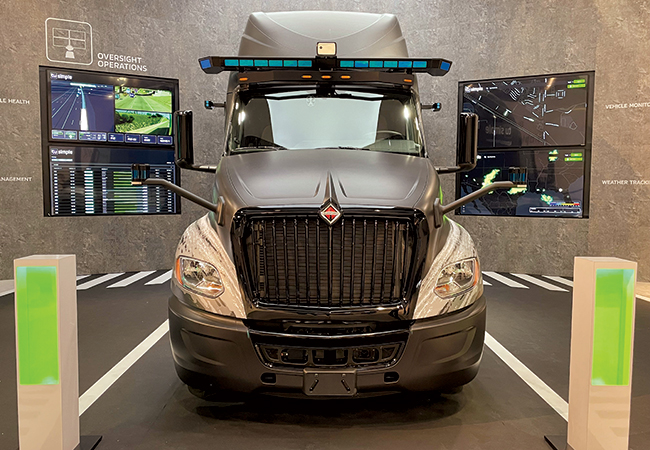
Seth Clevenger/Transport Topics
TuSimple
TuSimple is developing Level 4 automated driving technology with the goal of enabling unmanned Class 8 tractors to haul freight on a network of interstate routes across the United States, beginning in the Sun Belt.
In December 2021, TuSimple operated an autonomous truck on public roads in Arizona without a human on board during a milestone “driver-out” demonstration run.
Website: tusimple.com
Nasdaq: TSP
Founded: 2015
Executive:
Cheng Lu, CEO
Locations: Headquarters in San Diego with offices in Tucson, Ariz., and Fort Worth, Texas; the company also has operations in Europe and has been looking to sell its business in China
OEM and industry partners: Navistar Inc. (International Truck), Traton Group, Penske Truck Leasing, Ryder System Inc.
Fleet pilots: UPS Inc., U.S. Xpress Enterprises, Schneider, Werner Enterprises, McLane Co., DHL Supply Chain, U.S. Postal Service
Update, Dec. 6, 2023: TuSimple plans to lay off about 150 employees immediately, or 75% of the company’s U.S. workforce, and wind down U.S. operations after finding no buyers during a strategic review.
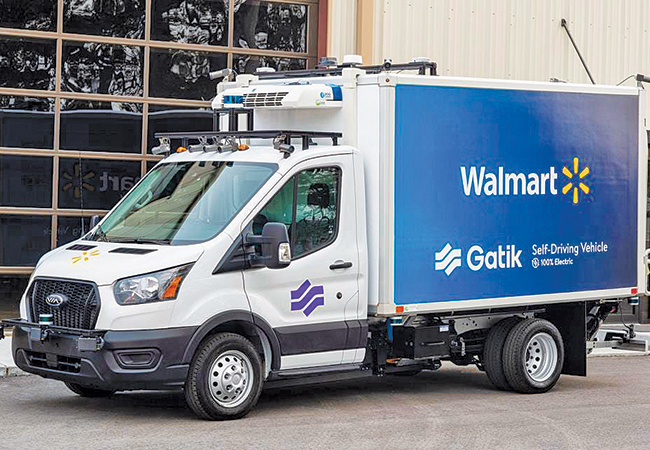
Gatik
Gatik
Gatik is commercializing Level 4 self-driving technology for light- and medium-duty trucks in short-haul operations. The company’s automated vehicles transport goods from fulfillment centers to pickup points such as retail stores and distribution centers.
In August 2021, Gatik began fully driverless operations on a shorthaul delivery route for Walmart on public roads in Bentonville, Ark.
Website: gatik.ai
Founded: 2017
Executives:
Gautam Narang, co-founder and CEO
Arjun Narang, co-founder and chief technology officer
Apeksha Kumavat, co-founder and chief engineer
Locations: Offices in Mountain View, Calif., and Toronto
Industry partners: Isuzu North America Corp., Cummins Inc., Ryder System Inc., Goodyear, ChargePoint
Commercial partners: Walmart Inc., Loblaw Cos., Pitney Bowes, Georgia-Pacific, KBX
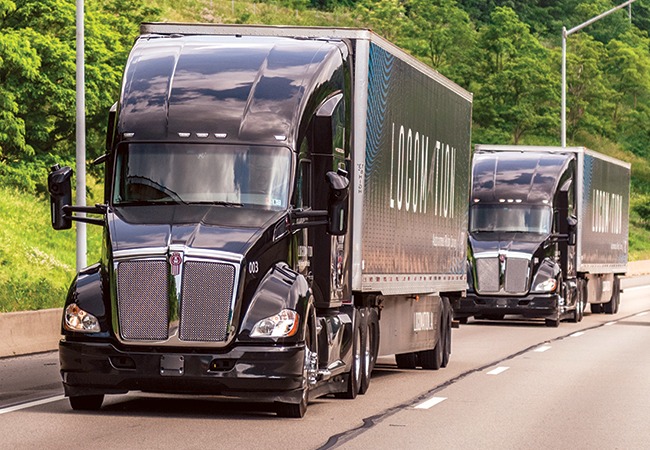
Locomation
Locomation
Locomation’s Autonomous Relay Convoy system electronically links a pair of trucks to form an automated convoy. The driver of the lead truck guides the convoy while the second truck follows autonomously, which could enable the driver in that vehicle to go off duty and rest.
From there, the company sees human-driven trucks leading unmanned follower trucks as the next progression for its technology.
Website: locomation.ai
Founded: 2018
Executives:
Çetin Meriçli, co-founder and CEO
Tekin Meriçli, co-founder and chief technology officer
Location: Headquarters in Pittsburgh
Fleet pilots: Wilson Logistics, PGT Trucking, Christenson Transportation, Stevens Trucking Co.
Update, Feb. 24, 2023: Driverless truck startup company Locomation has laid off most of its staff as it winds down operations, the second autonomous vehicle outfit in the Pittsburgh, Pa., area to encounter financial difficulties in four months.

Daimler Truck Global Communications
Torc Robotics
Torc Robotics is testing and developing Level 4 autonomous driving technology for heavy-duty trucks in hub-to-hub operations.
Torc is an independent subsidiary of Daimler Truck, which acquired a majority stake in the company in 2019.
Website: torc.ai
Founded: 2005; acquired by Daimler Truck in 2019
Executives:
Peter Vaughan Schmidt, CEO
Andrew Culhane, chief strategy officer
Locations: Headquarters in Blacksburg, Va., with testing and research facilities in Albuquerque, N.M.; Austin, Texas; and Stuttgart, Germany
Industry advisers: Baton, C.H. Robinson, Covenant Logistics, Penske Truck Leasing, Ryder System Inc., Schneider, Daimler Truck North America
Fleet pilot: Schneider
Waabi
Waabi
Waabi is developing Level 4 autonomous driving technology for heavy-duty trucks, starting with hub-to-hub operations.
The company has been refining its self-driving system, the Waabi Driver, through an “AI-first” approach designed to improve its flexibility and adaptability.
Waabi has been using its simulator technology to front-load the development of its self-driving system and minimize the need for on-road testing.
Website: waabi.ai
Founded: 2021
Executives:
Raquel Urtasun, founder and CEO
Vivian Sun, chief commercial officer
Dustin Koehl, head of transportation
Jur van den Berg, principal software engineer
Locations: Headquarters in Toronto with U.S. headquarters in San Francisco
Update, Sept. 21, 2023: Logistics specialist Uber Freight is teaming up with Waabi Innovation Inc. in an artificial intelligence-powered autonomous truck partnership.

Einride
Einride
Einride has developed cabless, autonomous, electric-powered vehicles designed to haul cargo within industrial sites and on public roads. The unmanned vehicles, which have no driver’s seat, steering wheel or pedals, are monitored by remote operators.
The company recently completed a two-week, unmanned pilot with GE Appliances on public roads in Selmer, Tenn., moving goods between a manufacturing facility and a warehouse.
Website: einride.tech
Founded: 2016
Executives:
Robert Falck, founder and CEO
co-founders Linnea Kornehed Falck and Filip Lilja
Locations: Headquarters in Stockholm, with offices in Gothenburg, Sweden; New York; Austin, Texas; and Berlin
Fleet and shipper partnerships: GE Appliances, Electrolux, Lidl, DB Schenker

John Sommers II for Transport Topics
Plus
Plus has introduced a Level 2 automated driving product that enables “supervised autonomy.” This “driver-in” system, called PlusDrive, automates acceleration, braking and steering during highway driving, but still requires the driver to remain attentive and engaged.
Plus said the on-road experience and data gathered through that initial product offering will help pave the way for it to introduce Level 4 autonomous driving capabilities.
Website: plus.ai
Founded: 2016
Executives:
David Liu, co-founder and CEO
Shawn Kerrigan, co-founder and chief operating officer
Locations: Headquarters in Santa Clara, Calif., with operations in the United States, China and Europe
OEM partners: Cummins Inc., Iveco, FAW
Fleet pilot: Amazon.com Inc.
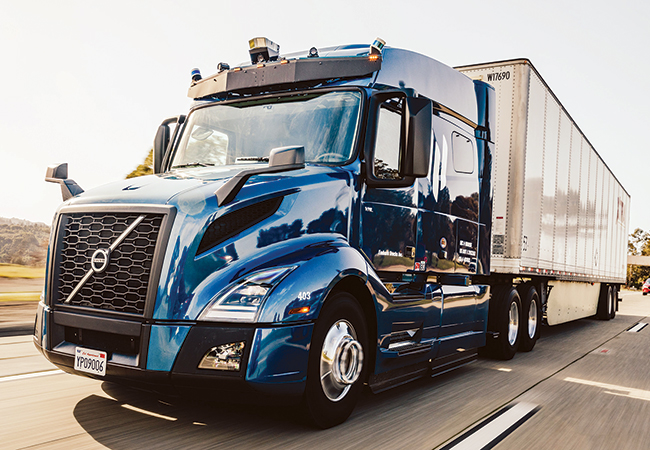
Embark
Embark
Embark is developing Level 4 autonomous driving technology to enable autonomous trucks to haul freight on major interstate shipping lanes. The company is establishing a network of transfer points where driverless longhaul trucks can exchange freight with human-driven trucks that provide first- and final-mile delivery.
Embark has designed its autonomous driving system and components to be compatible with Class 8 truck models built by Freightliner, International, Peterbilt and Volvo Trucks.
Website: embarktrucks.com
Nasdaq: EMBK
Founded: 2016
Executives:
Alex Rodrigues, co-founder and CEO
Brandon Moak, co-founder and chief technology officer
Location: Headquarters in San Francisco
Fleet and shipper partners: Ryder System Inc., Werner Enterprises, Bison Transport, Mesilla Valley Transportation, U.S. Xpress Enterprises, AB InBev, HP Inc.
Update, May 25, 2023: Embark Technology is set to be acquired by fellow autonomous vehicle software company Applied Intuition, the companies announced May 25.
Update, March 4, 2023: Autonomous trucking company Embark Trucks announced March 3 it is winding down operations and is exploring a liquidation or sale.
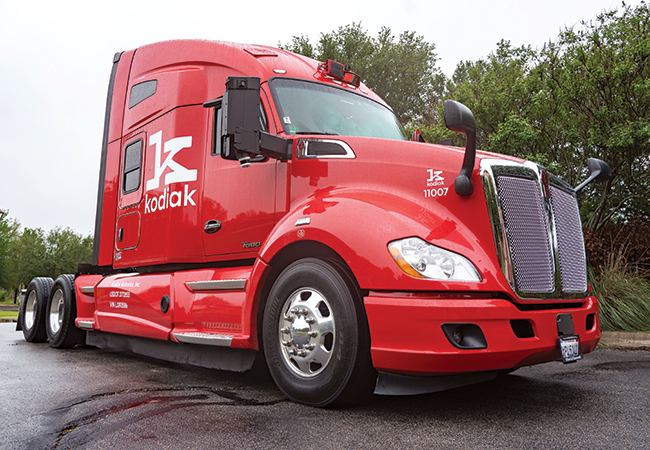
SunJae Smith/American Trucking Associations
Kodiak Robotics
Kodiak is testing and developing Level 4 automated driving technology to enable longhaul trucks to operate autonomously on highways.
Website: kodiak.ai
Founded: 2018
Executive:
Founder and CEO Don Burnette
Locations: Headquarters in Mountain View, Calif., with a testing and operations facility in the Dallas-Fort Worth area
Fleet and shipper partnerships: U.S. Xpress Enterprises, 10 Roads Express, Ceva Logistics, Werner Enterprises, Ikea
Update, Oct. 5, 2023: Maersk partners with Kodiak to test autonomous truck runs from Houston to Oklahoma City with a safety driver aboard.

Seth Clevenger/Transport Topics
Robotic Research
RRAI, the commercial division of Robotic Research, has developed autonomous driving and driver-assist technology for on-road and off-road vehicles.
Building on its work on automated military vehicles for the U.S. Department of Defense, the company has applied its self-driving system, AutoDrive, to heavy-duty trucks, terminal tractors and transit buses. Use cases for RRAI’s automated Class 8 truck technology include highway transportation, yard moves and rugged-terrain applications such as mining, logging and construction.
Website: rr.ai
Founded: 2002
Executive:
Chairman and CEO Alberto Lacaze
Location: Headquarters in Clarksburg, Md.
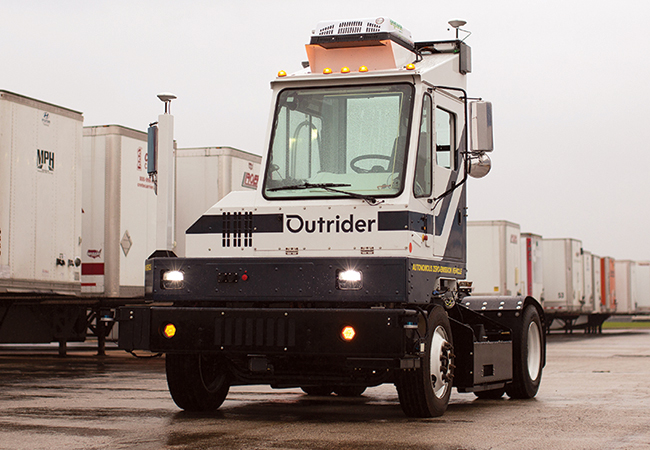
Human Design
Outrider
Outrider develops technology to enable autonomous yard operations for logistics hubs.
The company converts electric yard trucks into autonomous vehicles that maneuver between dock doors and parking spots, robotically hitch to and unhitch from trailers and can back trailers into tight spaces.
Website: outrider.ai
Founded: 2017
Executive:
Founder and CEO Andrew Smith
Locations: Headquarters in Golden, Colo., with a testing facility in Brighton, Colo.
Industry partners: Orange EV, Rite-Hite
Pilot program: Georgia-Pacific

Pronto
Pronto
Pronto offers a Level 4 autonomous driving system and driver-assist technology for off-road vehicles in the mining industry.
The company also has developed an aftermarket Level 2 driver-assist system called Copilot for Class 8 on-highway tractors.
Website: pronto.ai
Founded: 2018
Executives:
Anthony Levandowski, co-founder and CEO
Ognen Stojanovski, co-founder and chief operating officer
Robbie Miller, chief safety officer
Location: Headquarters in San Francisco
Industry partners: Bell Trucks America Inc.
Other developers working to bring autonomous driving technology to the freight transportation industry include Solo Advanced Vehicle Technologies/Terraline, Evocargo and Navya.
Want more news? Listen to today's daily briefing below or go here for more info:


